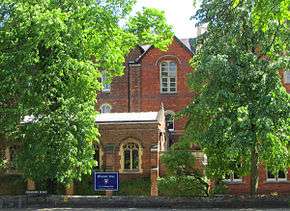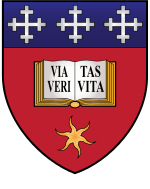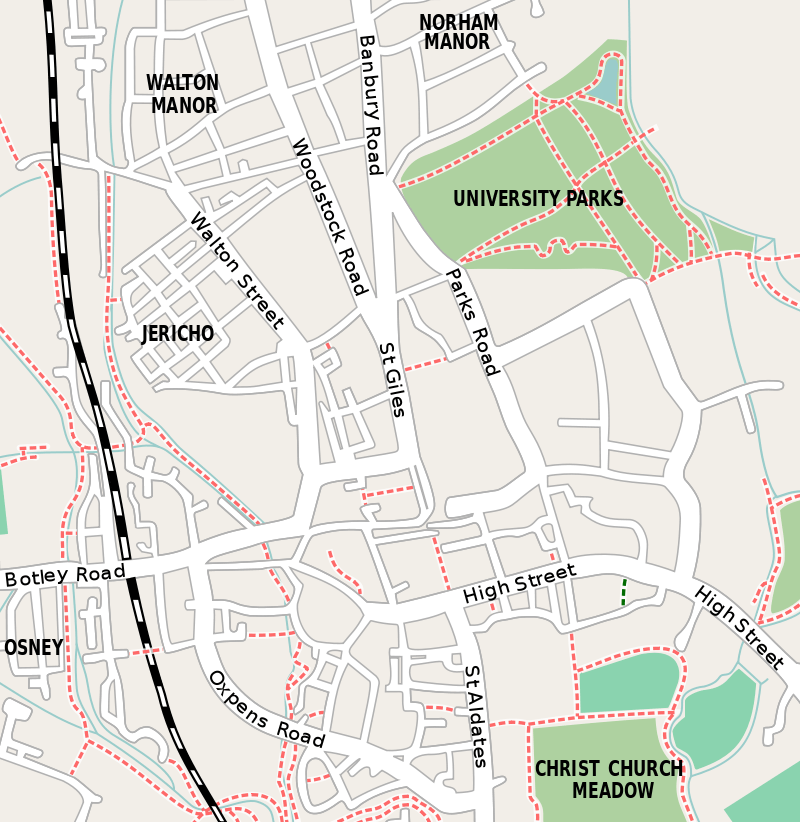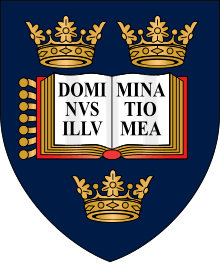Wycliffe Hall, Oxford
| Wycliffe Hall | |||||||||||||
|---|---|---|---|---|---|---|---|---|---|---|---|---|---|
| Oxford | |||||||||||||
 | |||||||||||||
 Blazon: Gules, an open book proper the pages inscribed with the Latin words "Via Veritas Vita" in letters sable on a chief azure three crosses crosslet argent and in base an estoile or. | |||||||||||||
|
| |||||||||||||
| Location | 54 Banbury Road, Oxford | ||||||||||||
| Coordinates | 51°45′47″N 1°15′36″W / 51.76302°N 1.260095°WCoordinates: 51°45′47″N 1°15′36″W / 51.76302°N 1.260095°W | ||||||||||||
| Motto |
Via, Veritas, Vita "The Way, the Truth, the Life" (John 14:6) | ||||||||||||
| Established | 1877 | ||||||||||||
| Named for | John Wycliffe | ||||||||||||
| Sister college | Ridley Hall, Cambridge | ||||||||||||
| Principal | Michael Lloyd | ||||||||||||
| Undergraduates | ~150 | ||||||||||||
| Website |
www | ||||||||||||
| Map | |||||||||||||
 Location in Oxford city centre | |||||||||||||
Wycliffe Hall is a Church of England theological college and a Permanent Private Hall of the University of Oxford in the United Kingdom. The college is named after John Wycliffe, who was master of Balliol College, Oxford in the 14th century.
Founded in 1877, Wycliffe Hall provides theological training to candidates for ordained and lay ministries in the Church of England as well as other Anglican and non-Anglican churches. There are also a number of independent and undergraduate students studying theology. It is rooted in the evangelical tradition of the Church of England.
History
Origins
For many centuries membership of the University of Oxford required subscription to the 39 Articles (part of the English Reformation heritage of the Church of England). The university was officially secularised by the Oxford University Act 1854 and the Universities Tests Act 1871, when it was opened respectively to students and lecturers of all religious creeds or none. Evangelical public meetings were held in 1876, partly in response to this development, where concerns were raised about how "the majority of clergy are professionally ignorant".[1] A committee, including Charles Perry (bishop) and Sydney Gedge MP, was formed to raise funds for two new theological colleges, one at both Cambridge and Oxford, which would provide supplementary training preparatory to ordination and do so "upon a sound Evangelical and Protestant basis".[2]
Funds were gathered rapidly and a founding council was formed for the Oxford college, including J. C. Ryle, Robert Payne Smith, Edward Garbett, and Edmund Knox (bishop of Manchester). The vision was to maintain the teaching of biblical and evangelical theology at Oxford and to promote "doctrinal truth and vital godliness", training ordinands to be "mighty in scripture...prepared to maintain the pure doctrines of the Reformed Church of England in all their simplicity and fullness".[3] The new hall was dedicated to John Wycliffe, who was master of Balliol College, Oxford in the 1380s, and is remembered as the 'morning star' of the Reformation.
Wycliffe is one of more than 20 Anglican theological colleges established in England during the late 19th century. Its "sister college" is Ridley Hall, Cambridge, which opened in 1881. Two evangelical organisations working among Oxford students were founded in the late nineteenth century; the Oxford Inter-Collegiate Christian Union in 1879 and the Oxford Pastorate in 1893. Wycliffe had close links with both from their inception. Indeed, of Wycliffe's first 100 students, 83 were Oxford graduates; a link that was bolstered by the second principal, Chavasse, who was incumbent of St Peter's Oxford prior to leading the hall. The Hall opened to non-graduates in 1890.
Twentieth Century
William Henry Griffith Thomas was one of Wycliffe Hall’s best known principals (serving 1905-10) and remains a noted theologian. He undertook much of the lecturing in college himself during his tenure[4] and is remembered today by a bronze bust in the dining room.
During the First World War, Wycliffe Hall housed refugees from Serbia and trainees from the Royal Flying Corps who built a practice aeroplane in the dining hall. In 1929 Wycliffe Hall staff and students on pilgrimage to Jerusalem were commissioned as peacekeepers during riots in Palestine. One student was shot through the shoulder.
Religious liberalism influenced Wycliffe Hall in the 1960s, especially with the 1962 appointment of David Anderson, a contributor to the Modern Churchmens' Union, as Principal. The evangelical churches lost confidence in the Hall and student numbers fell dramatically.[5] An official 1965 report on the college warned that 'dialogue with the present age...must be founded on and spring from evangelical conviction'.[6] Eventually, the Hall Council asked for Anderson's resignation in 1969 and instead sought clearer evangelical leadership, even inviting John Stott to take up the post. Stott declined, but other well known evangelicals were found to get the Hall back onto a firmer footing, including Peter Southwell, David Holloway, Oliver O'Donovan, and Roger Beckwith.
In 1996 Wycliffe Hall became a Permanent Private Hall of the University of Oxford, under the leadership of Alister McGrath. In 2005 it launched the Oxford Centre for Christian Apologetics in partnership with the Zacharias Trust.
Recent developments
Wycliffe became a focus of media attention in 2007 when a significant number of the academic staff left, including the vice-principal and head of pastoral theology. Three former principals wrote to the chair of the college council to protest about the way staff complaints of being bullied were ignored.[7] The crisis continued as a member of the council also resigned, having no confidence in the Chair of Council, Bishop James Jones.[8] The issues became public as members of the academic faculty lodged grievances against the principal, Richard Turnbull, for bullying.[9] After monitoring by the university, senior academics at Oxford complained that the curriculum was narrow and offered students insufficient intellectual development.[10] That year the bishop and the college were taken to an employment tribunal and admitted breaking the law. In 2009 the college was inspected by the Bishops' Inspection: it was commended in some departments but the inspectors expressed "no confidence" in its practical and pastoral theology.[11][12] Shortly after, the bishop, James Jones, resigned as chair.
In May 2012, under a new chair, the Bishop of Chester, the principal was given leave of absence from the college and he stepped down the following month. Late in 2012 the college began advertising for a new principal who could offer "wide and generous understanding of the major trends in contemporary Anglican evangelicalism, together with high level pastoral skills". In December 2012 it was announced that Mike Hill, Bishop of Bristol, had become chair of the college's council.[13] The process of appointment of a new principal stalled in January 2013: the Hall Council considered that five candidates were "of real quality" but that none of them offered "the desired balance of skills and attributes" required.[14]
In April 2013 the college announced that Michael Lloyd, Chaplain of Queen's College, Oxford, had been appointed as principal,[15] and he took up the position in the middle of the year.
Buildings
Wycliffe is located in the Victorian suburb of North Oxford. A site in the centre of Oxford was sought at the hall's foundation, and again in the 1890s, but neither attempt succeeded.
The original buildings on the Wycliffe Hall site were designed in the 1860s as family houses, until converted to their present use later in the nineteenth century. 54 Banbury Road was designed by John Gibbs in 1866 and built for Tom Arnold, literary scholar and son of Matthew Arnold. The house, known as Laleham, was larger than normal (with 14 bedrooms), even in an area known for substantial houses. This was to accommodate Arnold's in-house tutees. Number 52 Banbury Road meanwhile, lying immediately south of no.54, at the junction with Norham Gardens, was designed by Frederick Codd in 1868.[16][17] It initially housed the Holy Rood Convent (an Anglo-Catholic nunnery of the Society of the Most Holy Trinity, which was involved in printing the works of John Henry Newman).
Wycliffe Hall was established in 1877 and started at No. 54, which Arnold wished to sell as the tutorial business was abandoned. Additions were soon made to the house by William Wilkinson and Harry Wilkinson Moore in 1882–3 (North Wing and South Wing, the latter housing the Hall's library). The Hall acquired No. 52 when the sisters sold it in 1883. This second villa initially functioned as the principal's residence. A chapel was added between the two houses in 1896, designed by architect George Wallace.[17] The chapel was opened by the Bishop of Oxford in 1896 and has a stained-glass window representing John Wycliffe.
During the twentieth century, a number of houses in Norham Gardens were also acquired by the Hall, the gardens of No.2 and No.4 being amalgamated with the gardens of 54 Banbury Road to form a large green space on the site. A new dining hall was built to the west of 54 Banbury Road in 1913, blocking off the original main entrance to the Hall, but providing a new one featuring the Hall and University shields in the stonework doorframe (still visible today). The Talbot Rice Dining Hall was built to the east of 54 Banbury Road and opened in October 1980, allowing the older dining hall to become a lecture theatre. Later in the same decade No.2a Norham Gardens was built as a new lodging for the principal (the Hall library having moved to no.52 Banbury Road, which became known thereafter as 'Old' Lodge). The last major building work was the western extension of 2 Norham Gardens in the mid-1990s to provide additional accommodation and offices.
Academic programmes
Wycliffe Hall students are enrolled on a wide range of Oxford academic programmes, including the Certificate in Theological Studies, Bachelor of Arts in Theology, Bachelor of Theology, Master of Theology, Master of Philosophy in Theology, and doctoral programmes. In addition, there are a number of programmes accredited by Durham University. Wycliffe's Durham Common Awards programmes are distinctive among Anglican colleges in placing a strong emphasis on biblical studies modules.
Most teaching on the CTS, BTh, and Durham courses occurs in Wycliffe itself, in the Lower Common Room (the former library) and in the Lecture Theatre (the old dining hall). BA students take lectures off site with other undergraduates of the Faculty of Theology, although many of their tutorials occur at Wycliffe with the hall's own tutors.
In addition to the main teaching programmes, Wycliffe also operates a system of 'Integrated Study Weeks' (ISWs) on topics such as death, evangelism, ethics, and biblical hermeneutics. ISWs occur in 0th and 9th weeks, at either end of the standard Oxford term. Wycliffe terms are thus usually ten weeks long, rather than the more common Oxford eight.
Student life
The modern student body is very diverse, including about 60 Church of England Ordinands and about 90 independent students. Many nationalities are represented, the largest single body of overseas students being from the United States. The 'official' Bible translation used at Wycliffe is the NRSV, but students are free to use whichever translation they find most suitable.
All Wycliffe students are allocated to a fellowship group, each group being student-led but supervised by a college tutor. Fell Groups meet at 8:20 every Tuesday morning, immediately before community notices at 9:30am. Morning prayer is held in the Hall chapel on all other weekdays at 8:20am. The Lord's Supper is administered in chapel each Tuesday afternoon at 4:30pm. Attendance at these services is compulsory for full time ordinands and optional for independent students. Fellowship groups take it in turns to run a week of chapel services, arranging aspects such as leading, preaching, prayers and reading from among their own members.
All Wycliffe Hall students are members of the hall common room. A committee of 12 oversees common room activities, such as formal dinner drinks, a ball, prayer meetings, games nights, and representations to Hall management. Various informal student groups exist, including occasional reading groups focussing on a major theological text. Wycliffe students also take a full part in activities across the wider university. A partnership with Queen's College, Oxford sees Wycliffe students play sports on the Queen's teams. The Oxford University Parks are adjacent to Wycliffe and afford easy access to lawn tennis, cricket, and croquet facilties.
About half of Wycliffe students live on-site, either in 54 Banbury Road, or on Norham Gardens. Most other students live locally and travel in to college by foot, bike or car. A few students, particularly those on the 'mixed mode' programmes, live further away from Oxford and often come in on just one or two days per week (usually Mondays and Tuesdays). Students may take breakfast, lunch and dinner at Wycliffe's dining hall every day of the week during term time.
Academic achievements
In 2012, the college topped the University of Oxford’s Norrington Table, winning each of the theology prizes and with all five BA students achieving a first class degree.[18]
Notable academics
- Alister McGrath, Northern Irish theologian, priest, intellectual historian, scientist, and Christian apologist
- Oliver O'Donovan, Christian ethicist
Chronological list of principals
- Robert Baker Girdlestone, 1877-1889 (Victorian Biblical scholar)
- Francis James Chavasse, 1889-1900
- Henry "Harry" George Grey, 1900-1905
- William Griffith Thomas, 1905–1910 (Wycliffe's computer room is named in Griffith Thomas' memory)
- Henry "Harry" George Grey, 1910-1918
- Henry "Harry" Beaujon Gooding, 1919-1925
- Francis Graham Brown, 1925-1932
- John Taylor, 1932 to 1942
- Julian Thornton-Duesbery, 1943 to 1955[19] (subsequently Master of St Peter's College, Oxford)
- Francis John Taylor, 1956 to 1962
- David Anderson, 1962 to 1970 (resigned due to falling student numbers)[20]
- James (Jim) Peter Hickinbotham, 1970 to 1978 (retired)
- Geoffrey Shaw, 1978 to 1988[21] (retired)
- R. T. France, 1989 to 1995[22] (subsequently Rector of Wentnor)[23]
- Alister McGrath, 1995 to 2005 (subsequently Director, Ian Ramsey Centre for Science and Religion)[24]
- Richard Turnbull, 2005 to 2012 (subsequently Director, Centre for Enterprise Markets and Ethics)[25]
- Michael Lloyd, 2013 to present
A gallery of former principals decorates the staircase of South Wing.
Notable alumni
Nineteenth Century
- William Henry Temple Gairdner – missionary in Cairo and amongst Muslims, apologist (1896–97)
Early Twentieth Century
- Wilbert Awdry – creator of The Railway Series of children's books (1932–33)
- Lord Coggan – Archbishop of Canterbury 1974–1980 (1934)
- Verrier Elwin (1925–26)
- Joseph Fison (1929–30)
- Hewlett Johnson- The "Red Dean" of Canterbury (1900–01)
- Lamina Sankoh (1921–24)
- John Vernon Taylor (1937–38)
- Leonard Wilson (1922-23)
Late Twentieth Century
- Jonathan Aitken – politician, author and broadcaster
- James Harold Bell (1974–75)
- Carl N. Cooper (1982–85)
- Nicky Gumbel – Vicar of Holy Trinity Brompton and developer of the Alpha Course (1983–86)
- Ian Harland (1958–60)
- Michael Horton, theologian
- James Stuart Jones – Bishop of Liverpool, 1998–2013 (1981–82)
- June Osborne (1978–80)
- J. I. Packer – author (inc. General Editor of the English Standard Version) and theologian (1949–52)
- Vaughan Roberts – rector of St Ebbe's Church, Oxford and president of the Proclamation Trust (1989–91)
- Alan Gregory Clayton Smith (1979–81)
- Ray R. Sutton
- Bill Sykes – chaplain of University College, Oxford and author
- Rico Tice – evangelist, co-writer of the Christianity Explored course (1991–94)
- Rachel Treweek – Bishop of Gloucester (1991–94)
- Vernon White (1975–77)
- David Grant Williams (1986–89)
- Paul Gavin Williams (1990–92)
- N.T. Wright – writer and theologian, former Bishop of Durham (2003–2010)
- David Young (1958–59)
Twenty-First Century
- Jill Duff – Bishop-designate of Lancaster
- Sally Hitchiner (2006–09)
- D. Michael Lindsay – president of Gordon College, Massachusetts (2000–01)
References
- ↑ Nicholas Groves. Theological Colleges: their hoods and histories. The Burgon Society. p. 35. ISBN 0954411013.
- ↑ "The Guardian, 27 June 1877". p. 894.
- ↑ Theological Halls at Oxford and Cambridge. Bodleian Library. p. 536.
- ↑ "Church Society - Issues - History - Griffith Thomas - Portman/Wycliffe Hall". churchsociety.org. Retrieved 2018-01-15.
- ↑ Andrew Atherstone, Rescued from the Brink: The Collapse and Resurgence of Wycliffe Hall, Oxford in Studies in Church History Volume 44, 2008, p.355-365
- ↑ Central Advisory Committee on Training for the Ministry Inspection Report 1965
- ↑ Stephen Bates, Theological College's Head is undermining it, says Predecessors, The Guardian, 14 June 2007
- ↑ Crisis continues at Wycliffe Hall as Council member resigns. The controversy over Oxford theological college Wycliffe Hall has taken another dramatic turn after a council member resigned this week, saying she had serious concerns over the response of the Hall to allegations of bullying and intimidation. Daniel Blake, 5 October 2007, Christian Today
- ↑ Eeva John., Geoff Maughan and David letters, Wenham, #Church of England Newspaper# 28 September 2007
- ↑ Stephen Bates, religious affairs correspondent (11 August 2007). ""gives warning to theological college", ''The Guardian'', 11 August 2007". Guardian. Retrieved 31 May 2013.
- ↑ Dave Walker, www.churchtimes.co.uk/blog_post.asp?id
- ↑ Pat Ashworth, Church Times, 20 March 2009.
- ↑ "Appointment of Chair of Council". Wycliffe Hall. 7 December 2012. Retrieved 31 May 2013.
- ↑ "Statement from the Hall council on the appointment of the Principal of Wycliffe Hall". Archived from the original on 23 March 2013. Retrieved 31 May 2013.
- ↑ "Appoints New Principal". Wycliffe Hall. 15 April 2013. Retrieved 31 May 2013.
- ↑ Hinchcliffe, Tanis (1992). North Oxford. New Haven & London: Yale University Press. pp. 143–144, 151–153, 217. ISBN 0-14-071045-0.
- 1 2 Sherwood, Jennifer; Pevsner, Nikolaus (1974). The Buildings of England: Oxfordshire. Harmondsworth: Penguin Books. p. 319. ISBN 0-14-071045-0.
- ↑ "Achieves Top Marks". Wycliffe Hall. 7 December 2012. Retrieved 31 May 2013.
- ↑ "The Rev Canon J. P. Thornton-Duesbery". The Times (62106). 8 April 1985. p. 12.
- ↑ Andrew Atherstone, Rescued from the Brink: The Collapse and Resurgence of Wycliffe Hall, Oxford in Studies in Church History Volume 44, 2008, p.366
- ↑ Whyte, Duncan (23 March 2011). "Obituary: Canon Geoffrey Norman Shaw". Church Times. Retrieved 5 July 2014.
- ↑ "Obituary: Canon Dick France". Daily Telegraph. 17 April 2012.
- ↑ "Canon Dick France". 17 April 2012 – via www.telegraph.co.uk.
- ↑ "Professor Alister McGrath - Faculty of Theology and Religion". www.theology.ox.ac.uk.
- ↑ "Our Team".
